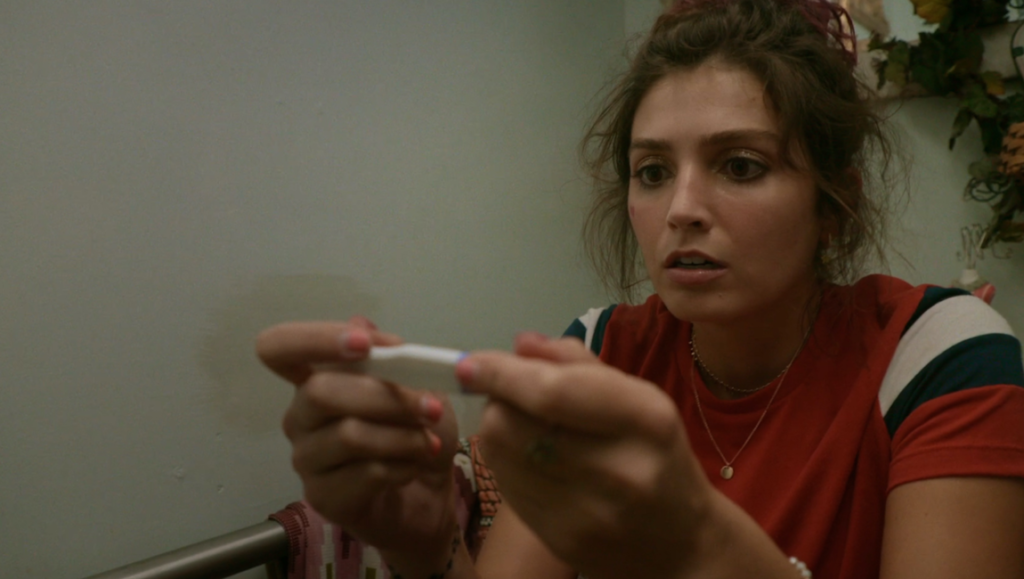As America stands on the brink of an illegitimate Supreme Court abolishing Roe v. Wade, abortion and women’s health rights have once again been thrust to the forefront of the public consciousness. Many have turned to recent work like Eliza Hittman’s Never Rarely Sometimes Always & Audrey Diwan’s Happening, or even Cristian Mungiu’s older 4 Months, 3 Weeks and 2 Days as guideposts for navigating this precarious moment in time, each film a bracing reminder of what is at stake if (or, more realistically, when) these rights are rescinded. Into this heated atmosphere comes Sophie Galibert’s Cherry, a charmingly light, big-hearted sorta-comedy that charts an increasingly desperate young woman’s 24-hour quest to decide whether or not she should have the procedure done. At a very brisk 76 minutes, Cherry is virtually a sketch, but one with so much energy and such carefully delineated, realistic relationships that it never feels slight.
Arriving late to her job at an old-fashioned magic shop, Cherry (Alexandria Trewhitt) rushes to the bathroom to take a home pregnancy test. No sooner has the little blue “positive” line appeared than Cherry’s boss begins banging on the door, haranguing her for her habitual tardiness. Fed up, he fires her, and Cherry immediately begins to cajole him into changing his mind, begging for one more chance. He shakes his head — this is clearly not the first time they’ve done this dance — and acquiesces. Most likely everyone knows someone like Cherry, that irresponsible friend who is so charming and so good at manipulating other people that they constantly seem to get their way. It’s a tough tightrope to walk, to keep a character like this sympathetic in spite of their obvious flaws, and so it’s all the more remarkable that Trewhitt imbues Cherry with a kind of guileless innocence. She’s indisputably a fuck-up, but you can’t help but want to take care of her.
After getting fired for a second time on the same day, Cherry rushes to a clinic. They’ve just closed, but once again Cherry talks her way into someone’s good graces, and so a very obviously put-out doctor examines Cherry, confirms the pregnancy, and lays out her options: keep it, wait and get a more expensive, invasive medical procedure a few weeks down the line, or make a decision in 24 hours and get a cheaper, chemically-induced abortion. And so begins her day-long odyssey, as the film structures itself around a series of encounters between Cherry and the significant people in her life — her roller-skating dance troupe that nurses some bad blood towards her; boyfriend and potential father-to-be Nick (Dan Schultz), a wannabe rockstar currently DJing at a roller rink; her mother (Sandy Duarte); her over-achieving sister (Hannah Alline); and finally her blue collar father (Charlie S. Jensen).
Cherry is frequently hilarious, although a sense of urgency and even dread can’t help but seep in around the edges. Beyond the question of whether or not to abort, Cherry must decide if the pregnancy is entirely unwanted, as she seems to have a notion that a child will usher her into adulthood, essentially forcing her to “grow up.” Her various encounters then become refractions of the complicated interplay between parents and their children. In this respect, Cherry’s long conversation with her father manages to unravel a lifetime of recriminations and misunderstandings with a minimal amount of fuss; here, a look or a gesture carries as much weight as words. And it’s by design; for all the goofy banter on display, Galibert and co-writer Arthur Cohen are getting at something deeper and more substantive amidst their otherwise lightweight sensibility.
There’s also a certain level of formal stylization at play here, as Galibert and cinematographer Damien Steck infuse the largely naturalistic milieu with subtle long takes and an expansive frame that allows the performers to fully perform. There are virtually no closeups or choppy shot-reverse-shot cutting here; instead, scenes play out almost in real-time, with conversations allowed to ebb and flow and detour. Other flourishes likewise resonate: Cherry’s visit to her dance troupe involves an actual performance of their entire elaborate routine, while recurring transitional scenes show Cherry roller skating blissfully to and fro her various destinations — it would be an obvious stretch to call these Ozu-ian pillow shots, but they do almost function in the same way. These modest virtues can sometimes get lost in an “actor’s showcase,” which Cherry certainly is with it’s a star-making turn from Trewhitt, but one shouldn’t discount the amount of directorial control it takes to make such things look effortless. And so ultimately, what Cherry achieves is one of the most difficult tasks in narrative film: the convincing suggestion that these characters existed before the cameras captured them and will likewise endure after the credits roll.
Published as part of Tribeca Film Festival 2022 — Dispatch 2.


Comments are closed.